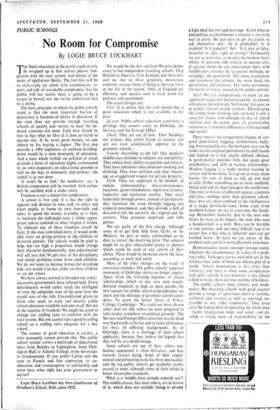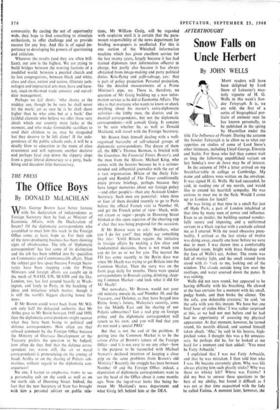No Room for Compromise PUBLIC SCHOOLS
By LOGIE BRUCE LOCKHART
THE finest education in the world could shortly be wrapped up in that sinister phrase 'inte- gration with the state system' and buried in the name of egalitarian theory. The last rites will be so elaborately set about with commissions, re- ports and talk of reasonable compromise that the public will not realise there is going to be a corpse to bewail, nor the victim understand that he is dying.
The basic principle on which the public schools stand is that the most important bastion of democracy is freedom of choice in education. If the state does not provide enough boarding schools of quality and variety to meet the de- mand, someone else must. Each man should be free to buy what he likes if it does no harm to anyone else. If he earns good money, no one objects to his buying a Jaguar. The first step towards a 1984 nightmare of uniform levelling- down would be a state monopoly of education. And a state which forbids on political or social grounds a form of education highly commended by its own inspectors on educational grounds is well on the way to monopoly and tyranny: the anthill is at our door.
'It won't be so bad,' the moderates say, 'a British compromise will be reached; both parties will be satisfied with a wider entry.'
Freedom is not a matter for compromise.
A school is free only if it has the right to appoint and dismiss its own staff, to select and reject pupils, to frame its own time-table and rules, to spend the money available as it likes, to maintain the staff-pupil ratio it thinks appro- priate and to conform to what religion it wishes. To abdicate any of these freedoms would be fatal. If the state controlled entry, it would prob- ably insist on giving priority to the children of divorced parents. The schools would be glad to help, but too high a proportion would change their character fundamentally. Any schoolmaster will tell you that 90 per cent of his disciplinary and moral problems come from such children. We do not want to become homes for mixed-up kids; nor would it be fair, either on those children or on the others.
We have always wanted to broaden our entry : successive governments have refused help. Every schoolmaster would rather teach the intelligent or even the adaptable sons of the poor than the stupid sons of the rich. Unconditional grants to those who need, or want and deserve public school education would be welcome to all. But not at the expense of freedom. We might be asked to change our staffing ratio to conform with the state system. But one cannot run a good boarding school on a staffing ratio adequate for a day school.
The essence of good education is variety; a state monopoly cannot provide this. The public school 'system' covers a multitude of educational ideas from Bedales to Uppingham, from Dart- ington Hall to Atlantic College, from Sevenoaks to Gordonstoun. If you prefer Calvin and the cane to French and free expression, or co- education and contraception to scholarship and straw hats, what right has your government to say no?
Logic Bruce Lockhart has been headmaster of Gresham's School, Holt, since 1955. We would be the first civilised Western demo- cracy to ban independent boarding schools. They flourish in America, New Zealand, and Australia, and no one in these genuinely democratic countries accuses them of being a 'divisive force in the life of the nation.' Only in England are efficiency and success such a focal point for jealousy and resentment.
The usual charges are :
First: It is unfair that the rich should buy a good education which is not available to the poor.
Second: Public school education constitutes a privilege that ensures entry to Oxbridge, the Services and the Foreign Office.
Third: They are out of date. Their buildings are archaic, they prefer Greek to science, and are not even academically superior to the grammar schools.
Fourth: According to the left, they inculcate middle-class attitudes to religion, sex and politics. They reduce boys' ability to question and criticise. They have ridiculous rules about not smoking and drinking. They wear uniform, and they 'encour- age an exaggerated respect for private property.'
Fifth: They are supposed to be hotbeds of sadism, homosexuality, class-consciousness, racialism, games-mindedness, repressive tyranny, hypocrisy and emotional sterility. They teach leadership through power, instead of persuasion; they humiliate the weak through fagging and corporal punishment, and they provide a hell of discomfort for the sensitive, the original and the creative. They promote ineptitude and stifle genius.
We are guilty of the first charge. Although some of us get little help from LEAs, or the Ministry, we give as many scholarships as we dare to attract the deserving poor. The solution might be to give educational grants to parents which could be used at any school of their choice. These would be increased above the basic according to need and merit.
Most of the other charges are the result of emotional attitudes. The public schools' supposed monopoly of Oxbridge entries no longer applies. Apart from the irritating injustice of closed scholarships, which in any case now usually demand standards as high as open awards, the two reasons for public school preponderance are merit and the shortage of grammar school candi- dates. To quote the Senior Tutor of Trinity College, Cambridge : 'We could not have chosen other than we did, unless we were prepared to take weaker candidates on political grounds.' The Services and Foreign Office interview boards bend over backwards to be fair and to make allowances for boys of differing backgrounds. As at Oxbridge, there is a shortage of state school applicants, because they believe the legend that they will be at a disadvantage.
Some schools are out of date, others not. Science equipment is often first-class, and bias towards classics dying. Some of their experi- mental and pioneering work has been spectacular, and the top public schools get academic results second to none, although some of their intake is. below eleven-plus standards.
What is a 'middle-class attitude towards sex'? The middle classes, like most others, are in favour of it; which does not exclude trying to project
a high ideal for love and marriage. As for religion and politics, a schoolmaster's concern is not with sect or party. He just tries to get his pupils to ask themselves not : 'Is it profitable? Is it modern? Is it popular?' but : 'Is it true or false, beautiful or ugly, right or wrong?' Fortunately we are as powerless to deaden the modern boy's ability to question and criticise as anyone else. If anyone thinks he can indoctrinate them with middle-class attitudes by tyrannous methods, he misjudges the generation. The more reactionary and tyrannous the attitude, the more lively the questioning and criticism. The satire movement, for better or worse, started in the public schools.
Alas! We fail conspicuously to teach 'an ex- aggerated respect for private property,' as anyone who knows the wholesale 'borrowing' that goes on in public schools would confirm. Discouraging the young from drinking and smoking is not a cause for shame, and although the day of school uniform may be nearly over, its praiseworthy intention is tJ minimise differences of background and wealth.
There remain the exaggerated charges of cor- poral punishment, fagging, snobbishness, bully- ing, homosexuality, etc. An intelligent case can be made out for corporal punishment in adult hands and limited to a few clearly defined offences. A good prefect punishes little, but needs great unselfishness and skill in human relationships. Modern fagging is a badly needed training in service and domesticity. It is good, as every mum knows, for sons to learn to tidy up and wait at table. Public schoolboys are no more snobbish, brutal and sadistic than teenagers the world over. They mix with boys of different regions, countries and class; perhaps more than grammar school- boys who arc often confined to the intelligentsia of a single provincial town. Some come from snobbish homes; we try to overcome this handi- cap. Remember, however, that to the mail who blows his nose in his fingers, the man who uses a handkerchief is a snob. Boys can be horrible to one another, and our most difficult task is to ensure that a boy who is 'different' does not get levelled down. At least we are aware of the problem and control it more efficiently nowadays.
Homosexuality occurs amongst teenage males, whatever the circumstances. It is less of a prob- lem today. Teenagers are so sated with sex in the holidays that some of them are almost glad of a break. School monasticism is less strict than formerly, and there is often some co-operation with girls' schools. Love, however, is not always a help to work; there are four months of holidays.
The public schools have failures and weak- nesses. But boarding schools with good masters provide a range of spare-time interests (artistic, technical and creative as well as sporting) im- possible in any other community. They keep alive the fading ideal of educating the whole man —heart, imagination, body and mind—and de- velop a strong sense of responsibility to the
community. By casting the net of opportunity wide, they hope to find something to stimulate enthusiasm, to offer challenge and to provide success for any boy. And this is of equal im- portance to developing his powers of questioning and criticism.
Whatever the results (and they are often bril- liant), our aim is the highest. We are trying to build bridges between the warring factions of a muddled world; between a puzzled church and its lost congregations, between black and white, class and class, nation and nation, illiterate tech- nologist and impractical arts man, have and have- not, stuck-in-the-mud trade unionist and out-of- date management.
Perhaps we fall short: 'who shoots at the midday sun, though he be sure he shall never hit the mark; yet as sure he is he shall shoot higher than he who aims but at a bush.' Our faithful clientele who believe we offer those very ideals which our country most lacks at the moment, and who make formidable sacrifices to send their children to us, may be misguided but they deserve to be left alone! If the inde- pendence of the public schools ends, it will be a deadly blow to education in the name of class resentment and will represent another decisive and perhaps fatal step down the slippery slope from a great liberal democracy to a petty, back- biting and decadent little bureaucracy.



































 Previous page
Previous page